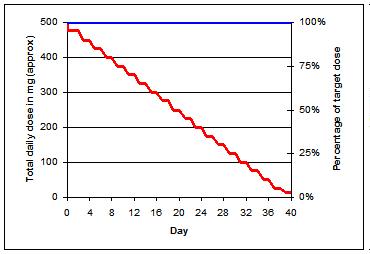| ||||||||||||||||||||||||
| ||||||||||||||||||||||||
Switch medication from Clozapine to Aripiprazole[1][2]
- Day 1: Decrease daily dose with 25 mg every 2 days
- Day 1: Start drug at target dose
- Clozapine is generally considered to be more effective than other antipsychotic drugs. Clozapine is often used in treatment-resistant schizophrenia (poor treatment response to 2 or more antipsychotic drugs). So a switch from clozapine to another antipsychotic drug could cause problems regarding effectiveness.[3] [4] [5]
- During this switch you could monitor ECG, especially in patients prone to QT-conduction problems.
- There is a possibility of QT interval prolongation.[6]
- ↑ Switches are based on literature references on this page and expert opinions of the authors. The authors have used pharmacokinetic and receptor affinity properties to determine the switch schedules
- ↑ Stahl, S. M. (2013). Stahl's essential psychopharmacology: Neuroscientific basis and practical applications (4th ed.). Cambridge University Press.
- ↑ McEvoy J P et al., Effectiveness of clozapine versus olanzapine, quetiapine, and risperidone in patients with chronic schizophrenia who did not respond to prior atypical antipsychotic treatment. Am J Psychiatry. 2006;163:600–610.
- ↑ Lewis S W et al., Randomized Controlled Trial of Effect of Prescription of Clozapine Versus Other Second-Generation Antipsychotic Drugs in Resistant Schizophrenia. Schizophrenia Bulletin vol.32 no.4 pp.715–723,2006.
- ↑ Agid O, Kapur S, Remington G, Emerging drugs for schizophrenia. Expert Opin Emerg Drugs. 2008 Sep;13(3):479-95.
- ↑ Stöllberger C, Huber JO, Finsterer J, Antipsychotic drugs and QT prolongation. Int Clin Psychopharmacol. 2005 Sep;20(5):243-51.
The editors of psychiatrienet.nl take the greatest care to provide up-to-date and accurate information on this site. Nevertheless, mistakes and omissions cannot be entirely excluded. No rights devolve from the information provided. The editors and other providers of information to this site accept no responsibility for the content of this site or for the information provided therein; neither do they accept responsibility for possible damages which may derive from the use of the information on this site or from the linked sites. The editorial board accepts no responsibility for the content of the (linked) sites, for access to them, or for the products and services on these sites, nor for the occurrence of errors, viruses, and/or disruptions in service.
